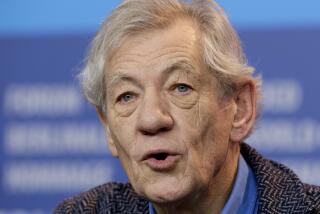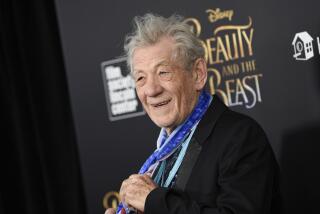Staying True to Spirit of the Bard : Ian McKellen Brings His Vision of ‘Richard III’ to the Big Screen
- Share via
When Sir Ian McKellen conceived of turning his very successful stage portrayal of Shakespeare’s Richard III into a movie, the reaction among studio executives was fairly underwhelming. At best, he encountered muted enthusiasm.
“When I started out three years ago, people were very suspicious of it, particularly in this town,” McKellen said over a breakfast of toast and coffee in his Beverly Hills-area hotel suite. “They’d say, ‘Good try, show me the movie when it’s made.’ They didn’t like to rubbish it, they knew there had been enough popular Shakespeare through the years. But they weren’t quite sure. One executive told me it was too dark, that people wanted Pollyanna Shakespeare.”
But McKellen--considered one of Britain’s premier Shakespearean actors--slogged on, devoting two more years of his life to selling his script and seeing his vision make it to the big screen.
“I find it very easy to sell something which I believe in,” said McKellen, known by most as “Sir Ian” since being knighted in 1991.
Then, almost three years after writing his “Richard III” screenplay during the U.S. leg of the Royal National Theatre of Great Britain’s worldwide tour of the play, MGM/UA took on the project, with McKellen playing the title character.
The Cambridge-educated actor was involved in nearly every aspect of its filming.
“There’s nothing in the film that I didn’t have a say in,” he said. “No decision was taken lightly. From my point of view, it was always taken in the light of ‘Am I being true to Shakespeare? Would he object?’ ”
The film--which opens Friday in Los Angeles and New York and also stars Annette Bening, Robert Downey Jr. and Maggie Smith--is a kind of revisionist version of the Shakespeare play, set in London during the 1930s.
McKellen’s primary goal was to make the play accessible to a mainstream audience.
“We’ve got the best writer of words, the man who knew more about human nature than any other writer since. Why shouldn’t we be on to a winner in the sense of reaching a wide audience?” he said.
In his script, McKellen dropped the Shakespearean “thees and thous,” and streamlined the three-hour play to a cinematic 100 minutes, but kept the plot intact and the script relatively faithful to the bard’s words and rhythmic style of speech.
“I hope people who know Shakespeare will see the wit of it and I hope they understand my motives, which is to--as always on stage and screen--do it for somebody who’s never seen it before,” said the 56-year-old McKellen.
He feels confident that the spirit of the play remains ultimately intact.
“I think Shakespeare would have liked it done like this,” he said. “He’s still alive to me and I still have a responsibility to him. It’s for his sake I’m doing this.”
While endeavoring to make Shakespeare more accessible, McKellen was ever-conscious of not oversimplifying his complex work.
“I think most actors who do Shakespeare want to make him available, but they don’t want to deny that it’s complicated and can be difficult and requires an attention from the audience that is more than just sitting back and watching Jay Leno,” he said. “But it rewards attention and maybe the experience is richer because of it.”
It could strike the viewer as a bit disconcerting to hear American actors like Bening and Downey reciting Shakespeare’s lines with distinctly American accents and wearing the clothing popular in prewar Europe. But that is just the point, McKellen believes: The script has a timeless quality that transcends its Elizabethan origins.
“Museum theater is hateful to me. . . . My concern in making the movie was to make sure that the level of reality, of believability of these people was there,” McKellen said. “That it didn’t look like a pageant with a lot of actors posing about or shouting in a theatrical way. And they weren’t all dolled up in floppy hats, so you could tell who was who.”
He chose the 1930s as the backdrop for his film because it was probably the last era where a European monarch could have gained real governing power.
McKellen was eager to go deeper behind the facade of the villainous King Richard to the pathos underlying his character.
“Just as ‘Hamlet’ sums up every young person’s angst about their family and the future of the world, I think ‘Richard III’ suggests that behind the smiling face of every villain there is a confused and very sad, almost tragic, person,” McKellen said. “That was my interest in doing this role, rather than just playing a jolly villain, as had been the [Laurence] Olivier approach.”
McKellen has spent the better part of the last decade attempting to bring Shakespeare to the masses. In the late ‘80s he did a one-man show called “Acting Shakespeare,” which he performed locally at the Westwood Playhouse.
After writing the script and finishing up his stage run of “Richard III,” McKellen decided to put theater on the back burner temporarily and concentrate on film, to prepare for his cinematic starring role. (He co-stars in Miramax’s period drama “Restoration,” also opening Friday, and “Rasputin,” an HBO movie in which he plays Czar Nicholas.)
“I’d just been doing movies,” he said. “I’d done six or seven things for the screen. I called it visiting other people, just going in and helping and playing a small part and watching and talking to people about how it’s done, feeling I was part of an industry that I really hadn’t felt a part of.
“So, when I came to do ‘Richard III,’ the camera seemed like an old friend,” he continued. “Had I done it immediately after the stage production, I would have been far too theatrical and histrionic and suspicious of the camera.”
McKellen would like to become more of a presence in Hollywood, though if plum roles don’t come his way he is content to continue his stage work.
He is also active in gay rights in Britain since his “coming out” in the late ‘80s. He muses that openly gay film actors have a tough time of it, since they are encouraged not to declare their sexual orientation because of a widespread industry assumption that it can limit their box-office appeal and breadth of available roles.
“I think this business is very hard on young gay people of both genders,” said the soft-spoken McKellen. “In this town, the commonly held belief is you can’t be an openly gay person and succeed as an actor. You can be gay if you’re an executive, a writer or a musician. You can be gay if you’re an agent, but all these people seem to be telling actors, ‘Ooooh, steady up,’ whatever their age. It seems to me rather unseemly and rather unnecessary.”
But McKellen is not worried about the personal repercussions of Hollywood’s prejudices. Indeed, he is considering attempting a cinematic version of “The Merchant of Venice” not merely because he’d like to tackle its anti-Semitism, but because he’d like to deal with what he perceives as its anti-gay behavior.
Then again, he might just relax a while and see what film offers come his way.
“As an actor I hope I’m offered some good parts by good directors. And that the script is good. That’s a lot of requirements,” he said. “I’m not just going to dive into any old movie. It’s too late in my career for that. I’m afraid my standards are too high.”
More to Read
Only good movies
Get the Indie Focus newsletter, Mark Olsen's weekly guide to the world of cinema.
You may occasionally receive promotional content from the Los Angeles Times.









